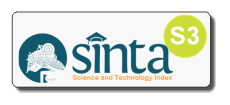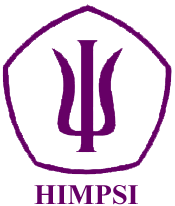Labor Market Uncertainty: Can Psychological Capital Promote Career Transition Readiness in College Students?
Abstract
Full Text:
PDFReferences
Adha, L. A. (2020). Digitalisasi Industri dan Pengaruhnya terhadap Ketenagakerjaan dan Hubungan Kerja di Indonesia. Jurnal Kompilasi Hukum, 5(2), 267–298. https://doi.org/10.29303/jkh.v5i2.49
Ariyanti, Y., & Bowo, P. A. (2018). Pengaruh Prakerin, Status Sosial Ekonomi Keluarga, dan Efikasi Diri terhadap Kesiapan Kerja. Economic Education Analysis Journal, 7(2), 671–687.
Atitsogbe, K. A., Sovet, L., & Pari, P. (2016). Analyse des barrières perçues dans l’élaboration du projet professionnel auprès d’étudiantes et étudiants au Togo. L’orientation scolaire et professionnelle, (45/4). https://doi.org/10.4000/osp.5247
Badan Pusat Statistik. (2022). Indikator Pasar Tenaga Kerja Indonesia Februari 2022. Badan Pusat Statistik. Retrieved from https://www.bps.go.id/id/publication/2022/06/14/0ab4432ce141b3d9fac13d92/indikator-pasar-tenaga-kerja-indonesia-februari-2022.html
Bakhshi, H., Downing, J. M., Osborne, M. A., & Schneider, P. (2017). The Future of Skills Employment in 2030. London: Pearson and Nesta.
Baluku, M. M., Mugabi, E. N., Nansamba, J., Matagi, L., Onderi, P., & Otto, K. (2021). Psychological Capital and Career Outcomes Among Final Year University Students: The Mediating Role of Career Engagement and Perceived Employability. International Journal of Applied Positive Psychology, 6(1), 55–80. https://doi.org/10.1007/s41042-020-00040-w
Bandura, A. (1997). Self-Efficacy: The Exercise of Control. New York: W. H. Freeman.
Baron, R. A., Franklin, R. J., & Hmieleski, K. M. (2016). Why Entrepreneurs Often Experience Low, Not High, Levels of Stress: The Joint Effects of Selection and Psychological Capital. Journal of Management, 42(3), 742–768. https://doi.org/10.1177/0149206313495411
Beaton, D. E., Bombardier, C., Guillemin, F., & Ferraz, M. B. (2000). Guidelines for the Process of Cross-Cultural Adaptation of Self-Report Measures. Spine, 25(24), 3186–3191. https://doi.org/10.1097/00007632-200012150-00014
Creswell, J. W. (2014). Research Design: Qualitative, Quantitative, and Mixed Methods Approaches. Thousand Oaks: SAGE Publications, Inc.
Heppner, M. J. (1998). The Career Transitions Inventory: Measuring Internal Resources in Adulthood. Journal of Career Assessment, 6(2), 135–145. https://doi.org/10.1177/106907279800600202
Heppner, M. J., Multon, K. D., & Johnston, J. A. (1994). Assessing Psychological Resources During Career Change: Development of the Career Transitions Inventory. Journal of Vocational Behavior, 44(1), 55–74. https://doi.org/10.1006/jvbe.1994.1004
Jansen, L. (2018). The Conceptualization of Career Transitions (Bachelor’s thesis). Tilburg University, Tilburg.
Körner, A., Lechner, C. M., Pavlova, M. K., & Silbereisen, R. K. (2015). Goal Engagement in Coping With Occupational Uncertainty Predicts Favorable Career-Related Outcomes. Journal of Vocational Behavior, 88, 174–184. https://doi.org/10.1016/j.jvb.2015.03.001
Krumboltz, J. D., & Worthington, R. L. (1999). The School-to-Work Transition From a Learning Theory Perspective. The Career Development Quarterly, 47(4), 312–325. https://doi.org/10.1002/j.2161-0045.1999.tb00740.x
Lemeshow, S., Hosmer Jr., D. W., Klar, J., & Lwanga, S. K. (1997). Besar Sampel dalam Penelitian Kesehatan (D. Pramono, Trans.). Yogyakarta: Gadjah Mada University Press.
Li, G., & Yan, S. (2016). Psychological Capital: Origin, Connotation and the Related Factors. Canadian Social Science, 12(8), 71–77. https://doi.org/10.3968/8710
Louis, M. R. (1980). Career Transitions: Varieties and Commonalities. The Academy of Management Review, 5(3), 329–340. https://doi.org/10.2307/257108
Luthans, F., Avolio, B. J., Avey, J. B., & Norman, S. M. (2007). Positive Psychological Capital: Measurement and Relationship with Performance and Satisfaction. Personnel Psychology, 60(3), 541–572. https://doi.org/10.1111/j.1744-6570.2007.00083.x
Luthans, F., Luthans, K. W., & Luthans, B. C. (2004). Positive Psychological Capital: Beyond Human and Social Capital. Business Horizons, 47(1), 45–50. https://doi.org/10.1016/j.bushor.2003.11.007
Miysell, K., & Wasisto, J. (2020). Persepsi Mahasiswa Program Studi Ilmu Perpustakaan Universitas Diponegoro Pada Peluang Kerja Information Professional. Jurnal Ilmu Perpustakaan, 9(2), 42–50.
Morton, S., Mergler, A., & Boman, P. (2014). Managing the Transition: The Role of Optimism and Self-Efficacy for First-Year Australian University Students. Australian Journal of Guidance and Counselling, 24(1), 90–108. https://doi.org/10.1017/jgc.2013.29
Perekonomian Indonesia Tetap Kokoh. (2023). Portal Informasi Indonesia. Retrieved from https://indonesia.go.id/kategori/indonesia-dalam-angka/6788/perekonomian-indonesia-tetap-kokoh?lang=1
Snyder, C. R. (Ed.). (2000). Handbook of Hope: Theory, Measures, and Applications. San Diego: Academic Press.
Snyder, C. R. (2002). Hope Theory: Rainbows in the Mind. Psychological Inquiry, 13(4), 249–275. https://doi.org/10.1207/S15327965PLI1304_01
Sugiyono. (2013). Metode Penelitian Kuantitatif, Kualitatif, dan R&D. Bandung: Alfabeta.
Suparman, S. (2023, July 14). Indonesia Aims to Elevate African Countries, Emboldening Gotong Royong Values. The Jakarta Post. Retrieved from https://www.thejakartapost.com/business/2023/07/14/indonesia-aims-to-elevate-african-countries-emboldening-gotong-royong-values.html
Tomasik, M. J., Hardy, S., Haase, C. M., & Heckhausen, J. (2009). Adaptive Adjustment of Vocational Aspirations Among German Youths During the Transition From School to Work. Journal of Vocational Behavior, 74(1), 38–46. https://doi.org/10.1016/j.jvb.2008.10.003
Top Universities in East Java. (2022). uniRank. Retrieved from https://www.4icu.org/id/east-java/
DOI: http://dx.doi.org/10.17977/um023v13i12024p139-148
Refbacks
- There are currently no refbacks.
Copyright (c) 2024 Jurnal Sains Psikologi

This work is licensed under a Creative Commons Attribution 4.0 International License.
Reference Manager :
|
Aliansi:
Plagiarism Checker :
This work is licensed under a Creative Commons Attribution 4.0 International License.



1.png)








